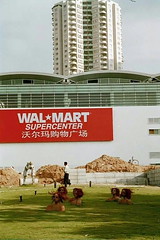Hong Kong Police Raid Independent Radio
 Despite without a license, a group of activists have run the Citizen's Radio for one year. Last night police and government officers suddenly raided this independent radio stations. They arrested a man and confiscated most equipment.
Despite without a license, a group of activists have run the Citizen's Radio for one year. Last night police and government officers suddenly raided this independent radio stations. They arrested a man and confiscated most equipment.There are only three legal radio stations in Hong Kong, a city populated by 7 million people. There are even more radio stations in Beijing than in Hong Kong, no mention of other cities. The Hong Kong government refuses to issue more licenses to any applicant. The activists of Citizen's Radio submitted their application last year and have not received any response. Hong Kong government blocks its ears to any demand for more radio channels. Hong Kong government always boasts of its free economy but it never applies to the area of media.
A few years, some popular hosts of radio phone-in program, who criticized government severely, were suddenly fired and Hong Kong people were worried about the freedom of speech and media autonomy. Since then, some people launched underground radio and other independent media (e.g. Hong Kong People's Radio).
Hong Kong's radio broadcasting is managed by the Broadcasting Authority whose memebers are appointed by the Chief Executive Donald Tsang who is also not elected by Hong Kong people. The policy-making body is the Commerce, Industry & Technology Bureau and the Secretrary is appointed by the Beijing government. There is no democratic institution and process for Hong Kong people to discuss and change the broadcasting policies.
Hong Kong government said that illegal radio broadcasters are harmful to other legitimate users. Yet no evidence has never been provided by officials. But the police raid is already doing serious harm to the civil society. The maximum penalty for a conviction of violating the telecommunication law is a HK$100,000 fine and five years' imprisonment. Further, we lost the Citizen's Radio, the only underground radio station in Hong Kong.
Radio broadcasting is one of the most popular media in Hong Kong. Now, except the government radio station, all commercial radio licenses are owned by the commercial sector. One of them belongs to the tycoon Li Ka Shing who has good connections with Hong Kong and Beijing governments.
Photo: Leo Prieto
 In China, there are 60 Walmart outlets, mostly located in the urban centers of coastal cities. But over the past ten years, its total investment in China is only about US$57 million. How could it be possible?
In China, there are 60 Walmart outlets, mostly located in the urban centers of coastal cities. But over the past ten years, its total investment in China is only about US$57 million. How could it be possible?
 The term "NGO" becomes popular in Hong Kong. While more attention is paid to it, more different voices about it are heard. Recently, Greenpeace China was criticized by mainland media as exaggerating the problems of "polluted vegetable" and "genetically modified food". The corporates and governments released research findings and information to refute Greenpeace's accusation.
The term "NGO" becomes popular in Hong Kong. While more attention is paid to it, more different voices about it are heard. Recently, Greenpeace China was criticized by mainland media as exaggerating the problems of "polluted vegetable" and "genetically modified food". The corporates and governments released research findings and information to refute Greenpeace's accusation. 


